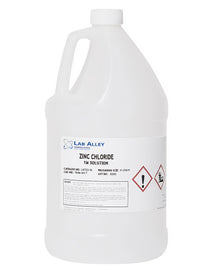Zinc Chloride, Granular, Lab Grade
Customer Reviews and Q&A
5.0
Rated 5.0 out of 5 stars
Based on 5 reviews
5
Rated out of 5 stars
5
Total 5 star reviews: 5 4
Rated out of 5 stars
0
Total 4 star reviews: 0 3
Rated out of 5 stars
0
Total 3 star reviews: 0 2
Rated out of 5 stars
0
Total 2 star reviews: 0 1
Rated out of 5 stars
0
Total 1 star reviews: 0 Rating
5 reviews
- Kim B.Verified BuyerReviewingZinc Chloride, Granular, Lab GradeI recommend this productRated 5 out of 5 stars1 year agoGood service
Very happy w the product!
Was this helpful? - Sarah B.Verified BuyerReviewingZinc Chloride, Granular, Lab GradeI recommend this productRated 5 out of 5 stars1 year agoPleased with Lab Alley
Very pleased with the product and the customer service.
Was this helpful? - Teri M.Verified BuyerReviewingZinc Chloride, Granular, Lab GradeI recommend this productRated 5 out of 5 stars2 years agoZinc Chloride, Granular, Lab Grade
Fast clean, nicely wrapped delivery
Was this helpful? - Terri H.Verified BuyerReviewingZinc Chloride, Granular, Lab GradeI recommend this productRated 5 out of 5 stars2 years agoZinc Chloride
Perfect I'm very happy
Was this helpful? - Michael W.Verified BuyerReviewingZinc Chloride, Granular, Lab GradeI recommend this productRated 5 out of 5 stars3 years agoZinc Chloride Granular
Very good, well sealed in container.
Was this helpful?
Loading...
Loading...
Have a question?
Become a Lab Alley Member and

RECEIVE exclusive offers, promotions, and discounts on chemicals.

Always have the product you need, when you need it with our AUTOSHIP program.



























